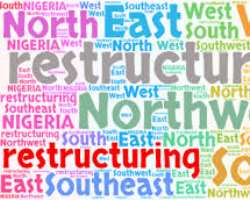Restructuring: Perspectives And Challenges

Before the two-thousand and nineteen general elections, the term restructuring became a buzz word in electioneering campaigns. Irrespective of the political divide, many aspirants promised to restructure Nigeria even though the meaning of the term appeared hazy.
Some scholars in political economy posit that if the structure of State is faulty, good governance as epitomized in transparency, accountability, the rule of law and representation will be utopian. Re-structuring therefore presupposes that there is a structure in place, which may be faulty that requires restructuring.
The ambivalent connotation notwithstanding, most political pundits agree that Nigeria’s generic problem emanated from the 1979 Federal Constitution which in the view of sound legal minds, is not a true reflection of the wishes and aspirations of the people. The advocacy of a home grown constitution has been long in coming.
This group of restructuring advocates and asserts that a reversal to the Nineteen sixty-three and its regional structure would be a panacea. Activists of this variety anchor their argument on the need to give power to the Regions as it was the case during the parliamentary system.
Some minority rights advocates push for restructuring in terms of creating more states to give each ethnic group a sense of belonging. This category of advocates decry the skewed structural federalism, which is inimical to their aspirations.
For people in the middle-belt, restructuring might mean freedom from the Hausa-Fulani hegemony. The area is populated by the Tivs, Idomas, Jukuns and other tribes, but because of the frequent clashes and struggle for power, the federally controlled Hausa-Fulani government has dominated and subdued the aborigines of the middle-belt. Restructuring therefore means freedom from Fulani domination.
For the Igbo ethnic group, restructuring as defined by some agitators is outright separatism from the geo-political entity – Nigeria. However, the Igbo intelligentsia re-calibrate restructuring to mean having a fair share of power in the arithmetic of power sharing. The Igbos seek the presidency- the highest office in the land.
In the Niger Delta Region, restructuring is a vociferous demand for resource ownership and control on one hand and fiscal federalism on the other. The dominant argument is that in a federalism, states should be given the right to own, control and enjoy their resources.
This advocacy was the motivating force of the “Kaiama Declaration” of December eleventh, Nineteen Ninety-Eight. Similarly the militant agitations in the oil rich Region culminated in the establishment of the Niger Delta Development Commission (NDDC), the Ministry of Niger Delta and the pacification of the agitators which found expression in the Presidential Amnesty Programme.
Whichever way restructuring is understood, the concept is nebulous hence analysts cannot pin it down to one pragmatic action point. The existence of several ideological permutations makes restructuring difficult to embrace by a critical segment of Nigerians.
Whereas, balancing the political equation is a major problem, most Nigerians see the country as a dichotomy between the north and the south. This also hinders the restructuring Others believe that power sharing should be done along the line of the six geo political zones while others hold that power should be rotated among the major ethnic groups. This thinking has rendered restructuring a mere good intention.
Ethnic chauvinism and religious dichotomy also fuel divisive tendencies. This is the more reason the concept of restructuring is viewed as a way of dividing the nation. In the view of some vested interests, Nigeria should remain as one big and strong indivisible entity to project the interest of continental Africa. Put together, restructuring will remain a distant dream.
However, objective analysts tenaciously hold the notion that restructuring should start with developing a homegrown constitution, which is the grundnorm upon which any structural reforms will be predicated.
The truism is that if the constitution is the basic document of the land, it implies that every structural change should be predicated on it. Then all Nigeria’s socio- cultural, political and economic challenges may be accommodated.
If a nation like Nigeria so stupendously endowed, parades bad statistics in all sectors, then restructuring may be a panacea. This has even become an emergency if Nigerians must live together as a people belonging to one corporate, indivisible entity.
Our leaders can take the bull by the horns by initiating the process of restructuring the Nigerian state. Our political economy has floundered from limping hope to utter despair and there is consensus among the intelligentsia that restructuring is the “silver bullet” that can assuage the fears of Nigerians and it will amount to grave injustice if we postpone the fundamental solutions to our national malaise.
Nigeria is ripe for restructuring and it is a revolution we can only delay to our collective peril.
